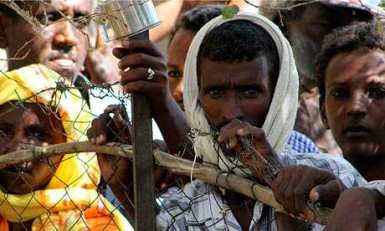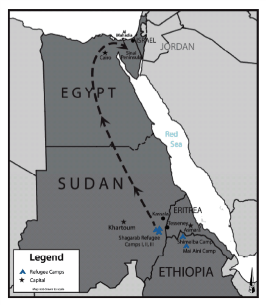UN urges Sudan, Egypt to take tougher stance on human trafficking
March 17, 2014 (GENEVA) – Members of the UN Human Rights Council have called on Egypt and Sudan to take action to investigate and prosecute human traffickers accused of kidnapping, torturing, and killing Eritrean refugees in the Sinai Peninsula.

In a statement issued on 13 March on behalf of the council, Hanns Schumacher, Germany’s permanent representative, said there was substantial evidence that Eritrean refugees had been the target of physical and sexual abuse “in a most brutal, frequent and systematic way”.
Thousands of Eritreans have fled repression in their homeland, which is referred to as the North Korea of Africa, usually transiting via Sudan and Egypt en route to Europe, Israel or other countries.
Traffickers operating within secretive criminal networks routinely prey on desperate migrants, kidnapping them from refugee camps near the Sudanese border with Eritrea and selling them to groups operating in Sinai, where victims are then subjected to torture to extract large ransom payments from their families.
While Schumacher acknowledged that both Sudan and Egypt had taken some steps to address the issue, the practice continued and instruments in place to address this situation – both at national and international level – are either lacking or not sufficiently implemented or enforced.
“We urge all countries concerned to launch a concerted effort to identify, and to investigate the alleged involvement of officials, and to hold accountable all persons involved in these horrendous crimes,” he said.
The council has also called on the countries concerned to “renew and strengthen” their efforts in combatting human trafficking.
CONDEMNATION FROM PARLIAMENT
In a resolution adopted the same day, the European Parliament condemned “in the strongest terms the terrible abuses to which the victims of traffickers are subjected”, saying there had been “an almost complete failure by both Sudan and Egypt to investigate and prosecute officials responsible for carrying out trafficking and abuses”.
It has called on Sudanese authorities to step up security measures in the Shagarab refugee camp, while underlining that a coordinated regional response was needed to address the problem.
The parliament has also requested that the European Commission make trafficking in the Sinai a high-priority topic on the agenda of political dialogue with Egypt, Israel and Sudan.

The report, I Wanted to Lie Down and Die: Trafficking and Torture of Eritreans in Sudan and Egypt, details harrowing testimonies from dozens of refugees who told HRW that Sudanese and Egyptian security officers often facilitated their abuse rather than arresting the traffickers.
All of the Eritreans interviewed by HRW who had arrived in Sinai in 2012 said that traffickers had taken them from Sudan to Egypt against their will.
ASYLUM DENIED
Many victims die at the hands of their captors and those that do manage to escape are often subject to indefinite detention in a third country and denied the right to apply for asylum.
Israel has taken a particularly tough stance on African migrants, with its troops often venturing into Sinai to deter African refugees from entering its territory. It has also constructed a 240km fence along its border to keep Eritreans out.
HRW wants Egypt and Sudan to publicly explain how they plan to tackle human trafficking in the region. It says measures to date have been inadequate and that traffickers continue to operate in the two countries with “almost complete impunity”.
“Egypt and Sudan should respond to this call for action at the UN with concerted efforts to arrest the traffickers and show zero tolerance for colluding security officials,” said Gerry Simpson, a senior refugee researcher at HRW who authored the latest report.
Up to 3,000 people flee Eritrea every month, according to the UN special rapporteur on the situation of human rights in Eritrea, while 4,000 trafficking victims are estimated to have died since the beginning of 2008.
It is believed that about 1,000 African refugees are currently being held in captivity and HRW has received reports of trafficking from eastern Sudan to Sinai as recently as February.
(ST)
